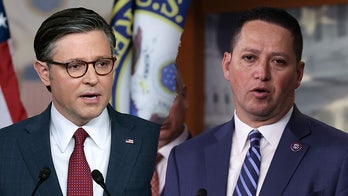The top Republican on the Senate Homeland Security and Governmental Affairs Committee introduced legislation Tuesday that would impose Congressional oversight for the first time on the more than 18 czars appointed by the Obama administration.
"The appointments of so many czars have muddied the waters, causing confusion and risking miscommunication going forward," said Sen. Susan Collins, R-Maine.
"We need to know, with clarity: Who is responsible for what? Who is in charge - the czar or the Cabinet official? Who can Congress and the American people hold accountable for government policies that affect daily life?" the Maine moderate warned in a Senate floor speech, saying that the traditional constitutional role of "advice and consent" by senators on significant policy positions has been circumvented in the process.
Collins said her amendment, which she is attempting to attach to a bill that funds the Interior Department, would withhold federal funds for the creation of any new czar position until the administration requires every czar to agree to testify before Congress if a "reasonable request" is made and mandate every czar produce a detailed "public, written report" twice a year of their actions and involvement in the creation of policy, rules, and regulations.
"This amendment would establish an oversight regime...provide transparency and accountability," Collins said.
In a letter to President Obama signed by five of her Republican colleagues, including Sen. Lamar Alexander, R-Tenn., second in the GOP leadership lineup, the group asked that the president consult Congress before establishing any additional czar positions.
News reports often inaccurately refer to certain positions as "czars," like the "drug czar" or Director of the Office of National Drug Control Policy. But this position, along with many others, is confirmed by the Senate.
The senators, in the letter, noted the discrepancy and said they are, instead, referring to positions "that you have established within the Executive Office of the President that are largely insulated from effective Congressional oversight."
This czar concern has bipartisan support in the Senate.
Sen. Russ Feingold, D-Wis., sent a letter earlier this month to the president, after hearing from numerous constituents concerned about the proliferation of czars.
"Specifically, I ask that you identify these individuals' roles and responsibilities, and provide the judgment(s) of your legal advisers as to whether and how these positions are consistent with the Appointments Clause," Feingold wrote.
Sen. Robert Byrd, D-W. Va., the most senior member of the august body who zealously guards the prerogatives and duties of the Senate, also expressed concern in a statement earlier this year.
"The rapid and easy accumulation of power by White House staff can threaten the Constitutional system of checks and balances," Byrd wrote in a letter to Obama. "At the worst, White House staff have taken direction and control of programmatic areas that are the statutory responsibility of Senate-confirmed officials."
Byrd specifically referred to Carol Browner's job as czar of the new White House Office of Energy and Climate Change. But the venerable senator, who carries a copy of the constitution in his suit pocket, also noted the use of czars by previous administrations, including that of Presidents George W. Bush and Richard Nixon.
Byrd said czars, who are not confirmed by the Senate, often "shield the information and decision-making process behind the assertion of executive privilege" and too often "have been allowed to inhibit openness and transparency, and reduce accountability."




